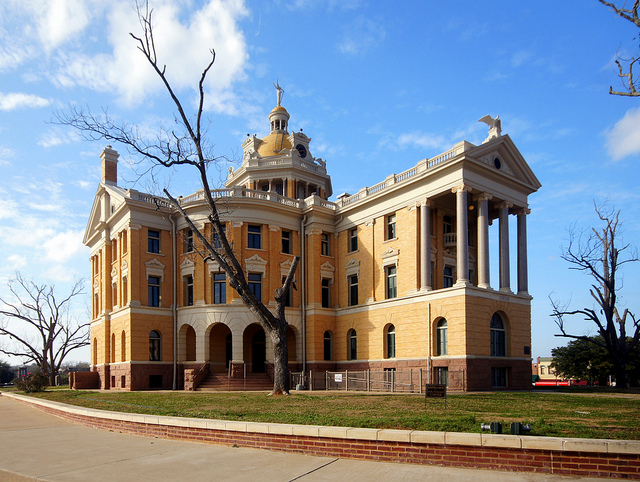
A patent-holding company called Beneficial Innovations has been suing over patents related to online gaming and online advertising since 2006. Media companies have been one of its favorite targets, and it claims its patents are foundational technology for targeted advertising.
But it apparently overstepped in 2011 when it filed its last major lawsuit against several major media companies in Marshall, Texas, a popular venue for patent disputes.
The 2011 lawsuit (PDF) was the last batch in a long list of media companies sued over the Beneficial patents. The defendants included Advance Publications, which owns Conde Nast and several newspapers and is the parent company of Ars Technica; ALM Media, which owns The American Lawyer magazine and legal newspapers and websites; American Media, which owns websites for Playboy, Flex, Fit Pregnancy, and Shape; Rodale, which publishes websites for Men’s Health, Runner’s World, and Bicycling; Scripps Interactive, which is responsible for Food Network, HGTV, DIY Network; Demand Media; Viacom; Village Voice Media; AutoTrader.com; and Amazon.
Five of those targets, including Advance, were simply users of Google's Doubleclick ad technology. Google had already reached a settlement with Beneficial in 2010, which included protections for its customers. Google intervened in the case and sued Beneficial for breach of contract. That case ultimately went to a jury, which yesterday issued a verdict (PDF) in Google's favor.
Google didn't try to prove a damages case, instead seeking only nominal damages of $1. But the outcome will prevent Beneficial from suing more Doubleclick customers and could send a message to other "patent trolls" that trying to double-dip after a settlement with Google is a bad idea.
The judge overseeing the case didn't allow Google to ask for attorney's fees during the trial, but Google may ask for such fees in post-trial motions. A Google spokesperson said, "Beneficial went back on the terms of its own license agreement, pursuing our customers for simply using our licensed services. This is a great outcome that the jury worked hard to get right.”
It's unclear what, if any, relief that will bring for the five Google customers who were sued. The public docket shows they all reached settlements with Beneficial before Google's case went to trial. According to David Rosen, one of the lawyers for Beneficial, the settlement agreement only licensed Google customers in a narrow situation: "if their use of a Google product would constitute indirect infringement of the patent by Google."
"We disagreed that they were covered," he said. "We appreciate and respect the work the jury did and are disappointed in the outcome."
As for what happens next, Rosen said his team is still analyzing the situation and has not made any decision regarding appeal or how to proceed.
He also wouldn't discuss the inventions at issue—widely used across the Internet, according to Beneficial's claims in lawsuits—or describe them in any way. "To be honest with you, I don't want to say much about the case, or characterizing what the patents are about. We believe Beneficial is fully within its rights to enforce its patents."
Of the dozens of companies that were sued by Beneficial over the years, the only defendant still involved in the litigation is Amazon. Others appear to have all settled with Beneficial. Past targets include well-known media names like CNET, The New York Times, and The Washington Post, as well as sites like CareerBuilder.
Beneficial is owned by Sheldon Goldberg, a Nevada lawyer who became one of the earliest well-known "patent trolls" after claiming he had patented tournament-style card games online. The Goldberg patent on a "network gaming system" became notorious when he started pursuing license fees from small gaming websites and was one of 10 patents featured in the Electronic Frontier Foundation's "Patent Busting Project" for "crimes against the public domain."
One of the patents asserted in this case is No. 6,712,702, a "continuation" of the notorious network gaming patents. The other one is 7,496,943, on a system for presenting advertising.
Greg Dovel, a lawyer whose firm still represents Goldberg, told me in a 2011 interview that people "have looked hard at these patents" and concluded that they're good. “It’s an original, basic patent in the targeted advertising space,” he said.
Beneficial and Goldberg don't seem to have much in the way of actual gaming businesses going on today. In earlier motions in this case over the scope of damages, Beneficial offered exactly one example of a website that practices its patents: blackjacktime.com. "15 years and counting!" boasts the website, which is nothing more than a single page stating "We are currently down due to hardware failure."
Reader Comments (50)
View comments on forumLoading comments...